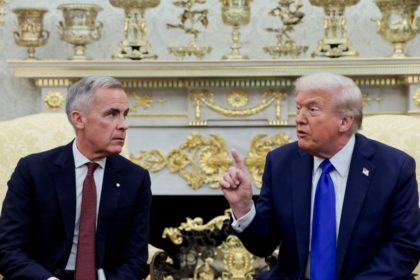US to Revoke Visas of Chinese Students Linked to Chinese Communist Party, Announces Secretary of State Marco Rubio
In a significant escalation of efforts to limit foreign influence in American academia, the United States government has announced it will revoke the visas of Chinese students who have connections to the Chinese Communist Party (CCP). The new policy, unveiled by Secretary of State Marco Rubio on Thursday, is part of a broader national security initiative targeting foreign students deemed potential risks, particularly those involved in sensitive fields of study.
Rubio made the declaration in a press briefing, stating, “Under President Trump’s leadership, the US State Department will work with the Department of Homeland Security to aggressively revoke visas for Chinese students, including those with ties to the Chinese Communist Party or studying in critical fields.” He further emphasized that the US will tighten its visa screening process for future applicants from China and Hong Kong.
This decision marks a renewed iteration of Trump-era immigration policies aimed at curbing Chinese access to American research and technological innovation. The US government has cited rising geopolitical tensions, intellectual property theft, and national security threats as primary motivations for these moves.
According to the 2024 Open Doors Report, China is currently the second largest source of international students in the United States, with 277,398 Chinese nationals enrolled in American higher education institutions. While the Biden administration discontinued the controversial “China Initiative” in 2022, recent bipartisan consensus has emerged around the perceived risks posed by Chinese students in advanced research programs.
The history of these concerns dates back to 2020, when the Trump administration first moved to limit access for Chinese graduate students. The move was rooted in fears that students with military or governmental affiliations might be siphoning sensitive research and innovations for Beijing’s strategic ambitions. At the time, Trump’s presidential proclamation warned against China’s “civil-military fusion” and efforts to exploit US academic resources.
This latest policy appears to be a resurgence of that approach, with increased coordination between the State Department, Homeland Security, and Congress. Chairman of the House Select Committee on the Chinese Communist Party, John Moolenaar, echoed Rubio’s sentiments, stating, “The CCP has established a systematic pipeline to embed researchers in U.S. institutions, giving them exposure to dual-use technologies with military potential.”
Moolenaar further raised alarms over what he described as a “Trojan horse” strategy used by Beijing. “America’s student visa system has become a Trojan horse for the CCP, offering access to top research institutions and threatening our national security. If we fail to act, it will undermine research integrity, displace American talent, and accelerate China’s tech ambitions,” he warned in a letter addressed to presidents of leading US universities.
The letter also called on universities to provide detailed records on Chinese students and scholars involved in research and to audit the influence of state-backed programs like Confucius Institutes—educational organizations sponsored by the Chinese government, which have already come under heavy scrutiny for potential political indoctrination and espionage.
In fact, the US House of Representatives recently passed legislation restricting federal funding to American institutions that maintain partnerships with Confucius Institutes or other entities linked to the Chinese state.
Rubio’s announcement was met with mixed reactions. While national security experts and Republican lawmakers lauded the decision as long overdue, civil rights groups and academic institutions expressed concern over the return of policies they say verge on racial profiling. The previous China Initiative, launched by the Department of Justice in 2018, had faced significant backlash over its impact on Asian-American scholars and its low conviction rate—only about 25% of those charged were ultimately found guilty.
Though the Biden administration officially shut down the China Initiative citing these issues, calls for its reinstatement have grown louder in recent months, particularly among Republican lawmakers and think tanks focused on US-China relations.
Universities are now grappling with how to implement compliance measures without violating civil liberties. Legal scholars have warned that sweeping visa cancellations based solely on national origin or perceived affiliations could trigger constitutional challenges and damage America’s standing as a destination for global talent.
Despite these concerns, the White House has remained largely supportive of policies aimed at safeguarding sensitive research from foreign interference. In a recent statement, National Security Advisor Jake Sullivan reiterated that academic openness must not come at the cost of national security. “We must strike the right balance between openness and vigilance,” he said.
Meanwhile, Beijing has yet to formally respond to the US announcement. However, the Chinese Foreign Ministry has previously denounced similar visa restrictions as discriminatory and politically motivated, accusing Washington of “weaponizing education” to advance its geopolitical agenda.
As the 2024 presidential election looms, the future of Chinese student visas is likely to remain a contentious topic. With President Trump expected to make foreign policy and immigration central to his campaign, measures like these are poised to gain further traction among his base.
The impact on higher education institutions could be profound, as universities may face shrinking international enrollment and greater scrutiny over foreign research funding. But for now, Washington appears resolute in its stance: national security takes precedence over academic diplomacy.
Also Read : Kiren Rijiju Supports Shashi Tharoor Amid Congress Criticism Over Surgical Strike Remarks








